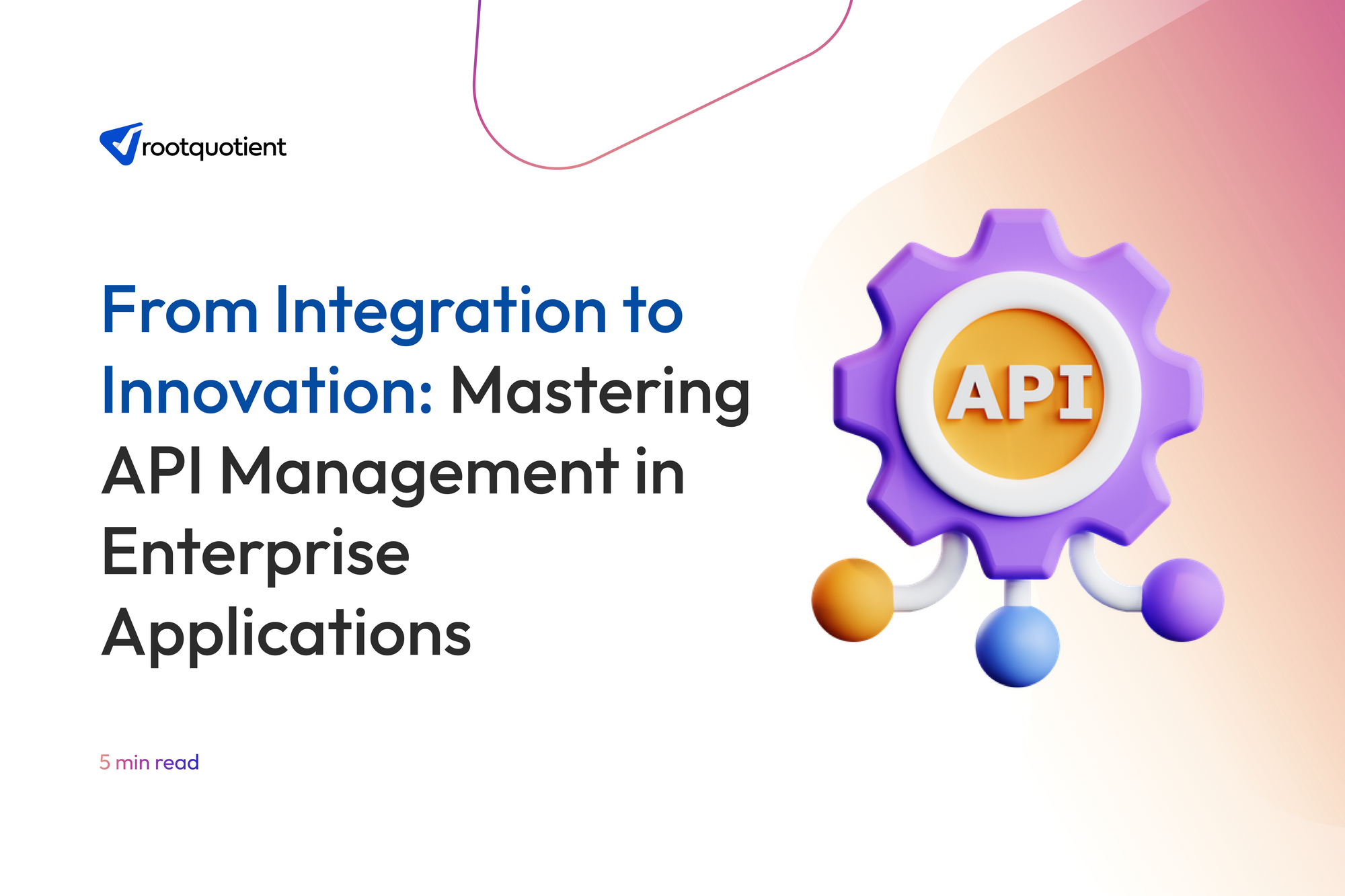Did you know that global API management market revenue is forecasted to be 13.7 billion USD by 2027, marking a 30% year-over-year growth? As businesses increasingly recognize the critical role of APIs in fostering digital innovation and connectivity, the adoption of robust API management solutions has become a cornerstone for staying competitive.
In the landscape of modern business, where the need for seamless connectivity is paramount, mastering API management is not just a choice; it’s a strategic imperative. It is a set of processes and tools that facilitate the creation, monitoring, and maintenance of Application Programming Interfaces (APIs).
Let’s embark on a journey to unravel the intricacies of API management, understand its pivotal role in enterprise applications, explore the tools and platforms driving this domain, and glean insights into constructing an effective management strategy for enterprise success.
What is API Management?
At its core, API management is like a librarian in a digital library, expertly organizing and managing access to a wide range of APIs, ensuring users in the SaaS ecosystem can easily find and use the resources they need. It is the facilitator that governs, monitors, and maintains these digital connections, making sure data flows smoothly between systems securely.
For instance, Salesforce, a leading customer relationship management (CRM) platform, serves as an orchestration hub for various business applications.
API Management for Enterprise Applications
API management emerges as a transformative force in the complex ecosystem of enterprise applications. Picture it as the unsung hero, tirelessly ensuring diverse systems operate in unison and efficiently sharing data.
Let’s say a travel booking platform integrates Google Maps API to provide users with accurate location information and directions. Google Maps’ API management ensures that the travel platform and mapping services communicate effectively, facilitating a seamless flow of location data for a better user experience.
Why is API Management Important in Enterprise?
API management powers agility, scalability, and security within your enterprise. It’s the key to adapting swiftly to technological changes, making sure data moves seamlessly within your organization and beyond, and fostering strong collaborations with external partners.
To illustrate, suppose various departments within an enterprise use different applications for their specific tasks – from customer relationship management to inventory management and financial operations. API management acts as the silent conductor, seamlessly connecting these disparate applications. It enables them to exchange information, creating a cohesive and integrated digital environment.
A good example would be Amazon, which utilizes APIs extensively within its e-commerce platform. The Amazon Marketplace Web Service (MWS) allows sellers to integrate their systems directly with the Amazon platform, managing inventory, orders, and payments seamlessly.
Exploring API Management Tools & Platforms
Let’s delve into some notable API management tools & platforms that are reshaping the digital landscape.
Apigee by Google Cloud
Apigee, now part of Google Cloud, is a comprehensive API management platform that enables organizations to design, deploy, and scale APIs. Many large enterprises, such as Walgreens, use Apigee to manage and secure their APIs. Walgreens leverages Apigee to enhance the customer experience by providing seamless integration with third-party applications, enabling features like mobile prescription refills and photo printing.
AWS API Gateway
Amazon API Gateway is a fully managed service provided by Amazon Web Services (AWS) that enables developers to create, publish, maintain, monitor, and secure APIs at any scale. Airbnb utilizes AWS API Gateway to manage its diverse set of APIs. By doing so, Airbnb ensures secure and efficient communication between its services and third-party applications, allowing for the integration of various functionalities like property bookings, payment processing, and user reviews.
Microsoft Azure API Management
Microsoft Azure API Management is a fully managed API gateway service provided by Microsoft Azure. It enables organizations to create, publish, secure, and analyze APIs, allowing them to manage the entire lifecycle of their APIs efficiently. Schneider Electric, a global energy management and automation company, uses Azure API Management to streamline its API ecosystem. Schneider Electric leverages this platform to expose and manage APIs that facilitate communication between their IoT devices, ensuring efficient monitoring and control of energy solutions.
Postman
Postman simplifies the process of working with APIs, making it easier for developers to create and manage API requests, automate testing, and collaborate with team members. Shopify, an e-commerce platform, employs Postman for API development and testing. Postman enables Shopify developers to design, test, and document APIs collaboratively, ensuring the reliability and functionality of their APIs that power the Shopify ecosystem.
IBM API Connect
API Connect provides a unified platform that includes tools for API design, creation, testing, monitoring, and analytics, making it easier for enterprises to develop and manage APIs efficiently. The New York Times has implemented IBM API Connect to manage and secure its APIs. The platform helps The New York Times expose and control access to its content and data APIs, supporting features like article retrieval, multimedia content, and user subscriptions across various digital platforms.
Kong
Kong is an open-source API gateway and microservices management platform that facilitates the creation, deployment, and management of APIs. Yahoo Japan has used Kong for API management within its infrastructure. Kong helps Yahoo handle a large volume of API traffic, ensuring high performance and scalability for its online applications.
Benefits of Enterprise API Strategy
Crafting a comprehensive API strategy is not merely a technical task; it’s a strategic move that reverberates across the entire business landscape. This strategy fosters innovation, streamlines operations, and positions your enterprise for sustained success.
Here are some specific benefits derived from a well-thought-out API strategy:
- Innovation Acceleration: APIs open the door to a world of innovation, allowing for the rapid development and deployment of new applications and services.
- Operational Efficiency: Streamlining data flow and communication between systems leads to enhanced operational efficiency, reducing bottlenecks and optimizing resource utilization.
- Market Agility: With a robust API strategy, your enterprise becomes agile and capable of adapting swiftly to market changes and technological advancements.
How to Build an API Management Strategy for Enterprise
Building an effective API management strategy requires a thoughtful approach aligned with broader business objectives. Let’s break down the essential steps that will guide you in constructing a strategy tailored to your enterprise:
- Align with Business Goals: Understand your organization’s overarching objectives. Your API strategy should seamlessly align with these goals, acting as an enabler rather than a standalone initiative.
- Ensure Security and Scalability: Security is paramount. Craft your strategy with a focus on ensuring the confidentiality, integrity, and availability of data. Simultaneously, plan for scalability to accommodate future growth seamlessly.
- Encourage Innovation: Foster a culture of innovation within your organization by promoting the use of APIs as tools for experimentation and development. This accelerates innovation and empowers your teams to explore new possibilities.
In conclusion, API management isn’t just a technical aspect of your enterprise; it’s the bedrock of seamless connectivity that fuels innovation and operational excellence. By embracing cutting-edge tools, understanding the profound significance of API management, and strategically planning your API journey, your enterprise can thrive in the ever-evolving technology landscape.
As you navigate the digital transformation journey, remember that API management isn’t a mere choice; it’s a necessity for enterprises aiming to stay ahead in the dynamic business landscape.
Stay connected. Stay innovative.



